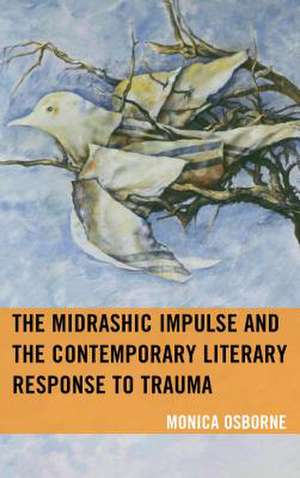Midrashic Impulse and the Contemporary Literary Response to Trauma: Lexington Studies in Jewish Literature
Autor Monica Osborneen Limba Engleză Hardback – 6 dec 2017
Din seria Lexington Studies in Jewish Literature
-
 Preț: 308.36 lei
Preț: 308.36 lei - 23%
 Preț: 648.21 lei
Preț: 648.21 lei - 23%
 Preț: 612.61 lei
Preț: 612.61 lei -
 Preț: 347.79 lei
Preț: 347.79 lei -
 Preț: 345.88 lei
Preț: 345.88 lei - 23%
 Preț: 617.22 lei
Preț: 617.22 lei - 23%
 Preț: 615.58 lei
Preț: 615.58 lei - 23%
 Preț: 560.40 lei
Preț: 560.40 lei - 27%
 Preț: 678.39 lei
Preț: 678.39 lei - 23%
 Preț: 613.66 lei
Preț: 613.66 lei - 23%
 Preț: 590.02 lei
Preț: 590.02 lei - 23%
 Preț: 617.67 lei
Preț: 617.67 lei - 27%
 Preț: 801.41 lei
Preț: 801.41 lei -
 Preț: 397.04 lei
Preț: 397.04 lei - 27%
 Preț: 682.94 lei
Preț: 682.94 lei -
 Preț: 352.79 lei
Preț: 352.79 lei - 27%
 Preț: 776.59 lei
Preț: 776.59 lei -
 Preț: 377.78 lei
Preț: 377.78 lei
Preț: 650.27 lei
Preț vechi: 844.50 lei
-23% Nou
Puncte Express: 975
Preț estimativ în valută:
124.44€ • 130.85$ • 102.81£
124.44€ • 130.85$ • 102.81£
Carte tipărită la comandă
Livrare economică 17 aprilie-01 mai
Preluare comenzi: 021 569.72.76
Specificații
ISBN-13: 9781498564908
ISBN-10: 1498564909
Pagini: 218
Dimensiuni: 152 x 229 x 20 mm
Greutate: 0.48 kg
Editura: Rowman & Littlefield
Seria Lexington Studies in Jewish Literature
ISBN-10: 1498564909
Pagini: 218
Dimensiuni: 152 x 229 x 20 mm
Greutate: 0.48 kg
Editura: Rowman & Littlefield
Seria Lexington Studies in Jewish Literature
Notă biografică
By Monica Osborne
Descriere
This book explores contemporary writers' use of nonrepresentational techniques, similar to those of ancient rabbis who composed classical Midrash, as they grapple with the violence of our era. With particular attention paid to Holocaust literature, the book identifies an important trend in literature about collective trauma.
